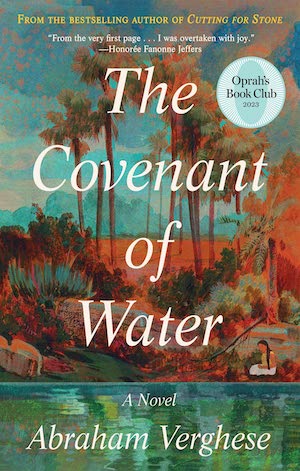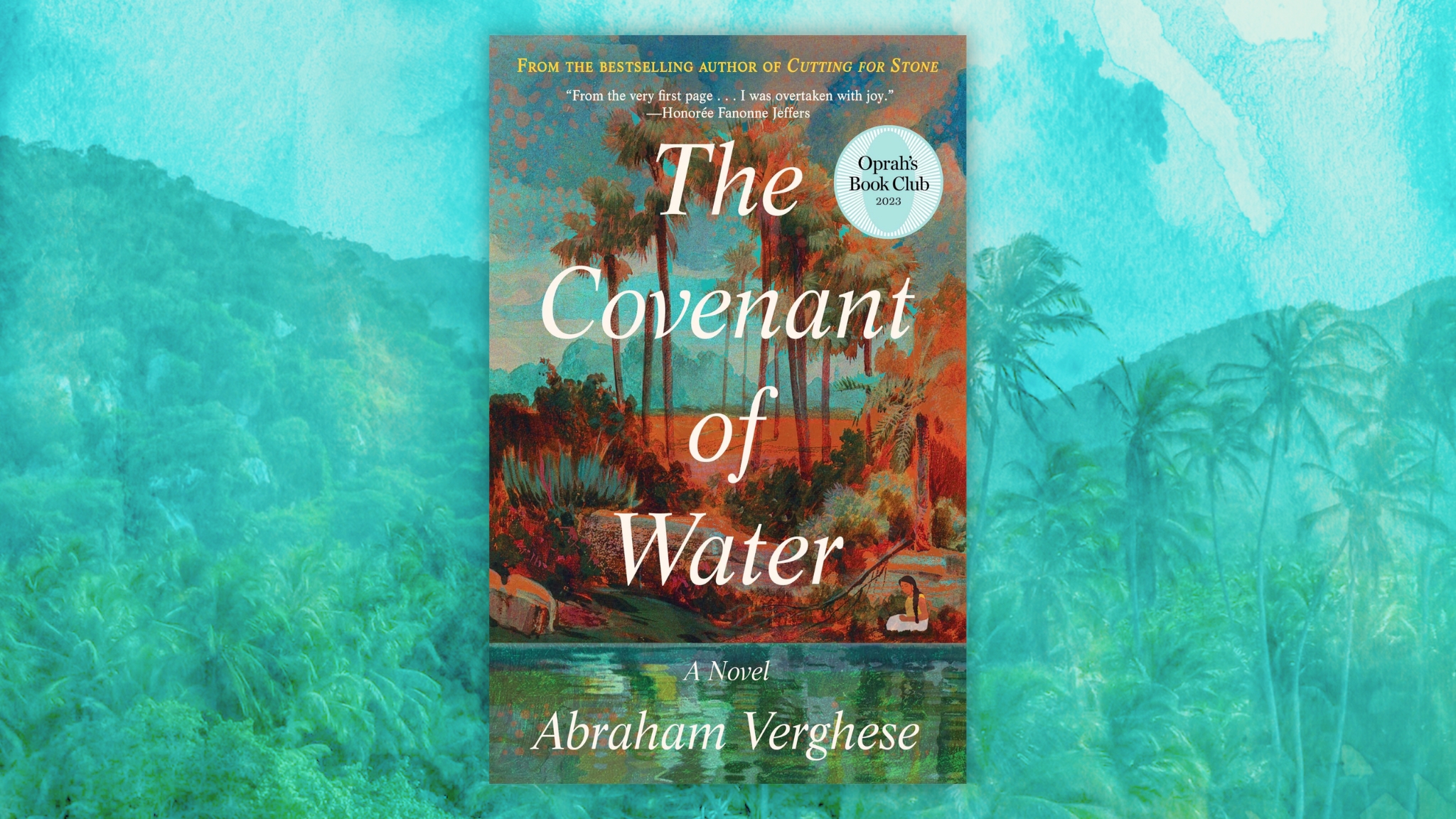The Covenant of Water by Abraham Verghese
Rarely, I find myself at a loss for words on how to review of novel. The Covenant of Water, (Grove Atlantic), the long-awaited, bestselling saga by Abraham Verghese is one such occasion. Oprah chose Covenant as the 101st selection for her book club, and it is easy to understand why. Covenant is so beautifully written, so rich in context, with unique characters and exotic settings that it demands acclaim. That accolade only makes it more difficult to write my review. Words will not do this novel justice, and frankly, I do not know where to begin. Nor do I want to spoil the reader’s joy of discovery as they plunge into this sweeping story. Honestly, I fear revealing too much, and I will try not to.
A Daunting Marriage and a Deadly Curse
At seven-hundred seventy-five pages, the story begins with the wedding of a young girl named Mariamma. Readers will come to know her as Big Ammachi, the matriarch of three generations who lives an extraordinary life during extraordinary times. The novel spans from 1900 to 1977 in Kerala, in South India’s Malabar Coast. The twelve year-old girl is being married off to a wealthy widower over three times her age and who has a small child. Mariamma leaves behind a cherished homeland which is surrounded by water and rice paddies, to live in the land-locked village of Parambil. Unbeknownst to her, her husband and his male relatives have been cursed. In every generation, at least one male dies by drowning.
Mariamma is homesick and frightened. Yet, over the decades, she is placed in situations where she draws upon an untapped inner strength as her unconditional love for her husband and his village’s traditions blossoms. The story ends in 1977, when Big Ammachi’s granddaughter arrives at a shocking medical discovery.
Over the decades, the story reveals the unyielding caste system in Indian society, the competing religious factions, the prejudice against those with physical and emotional disabilities and the growth of a nation struggling for freedom against the British Rule. Put into context, Big Ammachi’s tale begins before electricity comes to India and ends around the time when man has landed on the moon.
Connective Tissue of the Novel
Besides Big Ammachi, Verghese has created many heroes in this novel. The bittersweet escapades of Scottish surgeon Digby Kilgour, Swedish physician Rune Orquist, local politicians and even an elephant, are woven into the fabric of Big Ammachi’s life in Parambil.
By profession, author Abraham Verghese is practicing professor of medical theory and practice at Stanford Medical College. In writing this novel, the skilled physician cannot be separated from the gifted novelist. Medicine is the connective tissue of this book, and Verghese explores how science and people’s attitudes toward leprosy, childbirth, genetics and drug addiction have changed throughout the decades. He adroitly describes a series of medical procedures, and the various deeds and misdeeds of doctors that irrevocably impact the fates of his characters.
In his introduction to “Covenant,” Verghese remarks about writing the novel during the pandemic: “The day job was never more challenging than when Covid arrived; the prevailing emotion I felt — that of finding meaning in a world where there is much suffering — no doubt infuses the book.”
A Novel to Be Savored
The New York Times Book Review has compared The Covenant of Water to Amy Tan’s Joy Luck Club and Jhumpa Lahiri’s The Namesake. These three novels transport us to distant societies unlike our own, and whose characters resonate with us long after the final page. And like “Covenant,” those novels are rifled with pages where bad things happen to good people. In “Covenant,” it is not a spoiler to reveal that Big Ammachi’s life is filled with grief and loss, but she relies upon love and faith to survive those tragic ordeals.
It has taken fourteen years for Verghese to follow up his sensational Cutting for Stone, a novel about conjoined twins in Ethiopia which remained on the New York Times Bestseller list for two years. In The Covenant of Water, Verghese allows his characters to suffer, and the reader along with them, yet through his wondrous, panoramic historical tale of India’s freedom, he touches our souls. He provides us with a classic novel to be savored for its richness of language and beauty that grows in the heart of Big Ammachi.
If you read one book this summer, make it The Covenant of Water. You will not regret it.
 Abraham Verghese is the Linda R. Meier and Joan F. Lane Provostial Professor and Vice Chair of Medicine, Stanford University School of Medicine. He sees patients, teaches students and writes.
Abraham Verghese is the Linda R. Meier and Joan F. Lane Provostial Professor and Vice Chair of Medicine, Stanford University School of Medicine. He sees patients, teaches students and writes.
From 1990 to 1991, Abraham Verghese attended the Iowa Writers’ Workshop at The University of Iowa, where he obtained a Master of Fine Arts degree. His first book, My Own Country, about AIDS in rural Tennessee, was a finalist for the National Book Critics Circle Award for 1994 and was made into a movie directed by Mira Nair and starring Naveen Andrews, Marisa Tomei, Glenne Headley and others. His second book, The Tennis Partner, was a New York Times notable book and a national bestseller. His third book, Cutting for Stone was an epic love story, medical story and family saga. It appeared in hardback in 2009, and is in its 9th printing and is being translated into 16 languages. It is a Vintage paperback and was on the New York Times bestseller list for over 110 weeks at this writing. His latest novel, The Covenant of Water, is from Grove Press.
Verghese has honorary degrees from five universities and has published extensively in the medical literature, and his writing has appeared in The New Yorker, Sports Illustrated, The Atlantic Monthly, Esquire, Granta, The New York Times Magazine, The Wall Street Journal and elsewhere. He is an elected member of the National Academy of Medicine and the American Academy of Arts & Sciences. He was awarded the National Humanities Medal by President Obama in 2016.
His writing, both non-fiction and fiction, has to do with his view of medicine as a passionate and romantic pursuit; he sees the bedside skill and ritual of examining the patient as critical, cost saving, time-honored and necessary, though it is threatened in this technological age. He coined the term the ‘iPatient’ to describe the phenomenon of the virtual patient in the computer becoming the object of attention to the detriment of the real patient in the bed. His is an important voice for humanism in medicine and for anticipating the unwanted consequences of new technologies before they are introduced.
RELATED POSTS:
See what BookNationbyJen had to say about the book!





